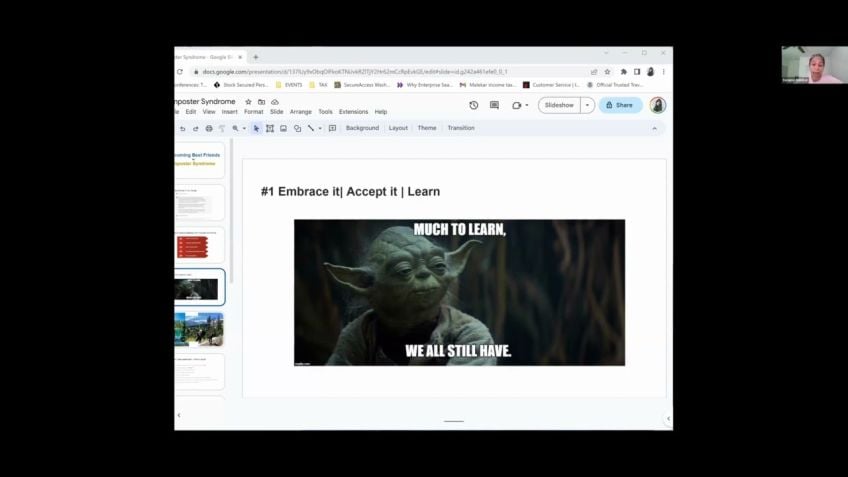Melissa Houghton - Battles of an Impostor
Overcoming Imposter Syndrome: Recognize, Rationalize, and Reflect
Welcome, tech enthusiasts! Today, we had the privilege of having Melissa Houghton, a lead software engineer from Xeni, lead a powerful discussion about a topic that's all too common in the tech industry: imposter syndrome.
Understanding Imposter Syndrome
Imposter syndrome is the feeling of being a fraud, coupled with the inability to internalize our achievements. According to a study by Clinical Psychologists, Pauline Klan and Suzanne Iams, nearly 70% of people experience it at some point in their lives. And, it's particularly prevalent among those in tech, who are constantly having to learn and adapt.
Recognizing Imposter Syndrome
Dr. Valerie Young identified five subtypes of imposter syndrome, said Melissa. These are:
- The Perfectionist
- The Natural Genius
- The Superhero
- The Expert
- The Soloist
By understanding these types, we're better able to recognize when we or our peers might be experiencing imposter syndrome.
Fighting Imposter Syndrome
Although dealing with imposter syndrome can be challenging, Melissa suggested a "three-step process to help us win the battle against it." These steps include:
- Recognizing the signs of imposter syndrome
- Rationalizing the situation and reframing our thoughts
- Reflecting on our accomplishments
"Through these steps, the imposter syndrome can become a force for good to motivate oneself to take on challenges and keep learning." Melissa shared.
Helping Others Battle Against Imposter Syndrome
We must extend the practice of recognition, rationalization, and reflection to others around us. Whether it's fostering a positive and inclusive work environment or guiding others towards new opportunities, every little helps. After all, "everybody needs a champion," Melissa aptly noted.
Flipping the narrative
Imposter syndrome might seem like an uphill battle but reframing it as a motivation for improvement and recognizing its presence can go long way. The key, as Melissa puts it, is not to freeze, but keep moving forward, using failure as a stepping stone and reflection as a lens of growth.
In conclusion
Imposter syndrome need not be an insurmountable hurdle. As we recognize, rationalize, and reflect, we can come out stronger on the other side. Remember, you're not alone and there's always support available if you feel overwhelmed.
Resources Available
For resources related to this talk, grab your QR code reader or visit the link here: bit.ly/resources
Video Transcription
Thanks everyone for joining in today. I'm very happy to be here with you at the Women Tech Global Conference. So my name is Melissa Houghton and I'm a lead software engineer at a Xeni based in Melbourne Australia.So I focus on mostly.net and Azure, but software developer in tech, just like most of you. I don't know how much time we'll have for questions. I will stay on hop in at the end and then um you can connect with me on my socials which are up on the screen if you want to chat to me that way. So, imposter syndrome, how many of you have heard of imposter syndrome if we were in person? And I could see all your beautiful faces. I would ask you to raise your hands and I would expect to see many hands raised if you had not raised your hands. That's OK. You're in the right place, but it's not a new topic. When I was doing research for this talk, I found hundreds of articles and TED talks on this very subject. There were talks by psychologists, educators, students and business professionals, people from all different backgrounds, genders, ethnicities and they all shared their research on imposter syndrome, but most importantly, they shared their personal experiences with it.
One of the talks that I found was from Ted X in Sydney by Mike Kennon Brooks. One of the CEO S and founders of Atlassian. He shared his story of imposter syndrome how when at last was starting up as successful and he was winning Entrepreneur of the Year Awards. He felt like a fraud Yet he learned that others felt the same way and that this feeling does not go away. However, he learned how to not let it hold him back, how to use his fear as motivation and we can do that too. Clinical psychologists, Pauline Klan and Suzanne Iams first defined imposter syndrome in 1978. They defined it as an internal experience of intellectual phoniness despite outstanding academic and professional accomplishments, their study focused on women specifically. But later studies have found it to be prevalent across all genders. It's known by a few, few different names.
But really, it's that feeling that you are a fraud and the inability to internalize your achievements. So why do people experience imposter syndrome? Who experiences it? What does it look like? How can we battle against it and how can we help others battle against it too? That's what I want to talk to you about today. But first, why me, why am I the one sitting here talking to you? I regularly ask myself the same question. My very first conference talk was on the subject and it was at a conference in Sydney called DDD and it was the Lock Note. Uh when I first heard that they wanted me to do the Lock Note as my first conference talk, I thought it must be some sort of prank. It was my last night in Perth before moving across Australia to the other side of the country over to Melbourne. And I was leaving a job as a mid-tier developer at a bank where I had worked for 4.5 years and I was about to start a new role as a senior at a different company that I had always looked up to as employing some brilliant and amazing people. The Perth version of this conference had just finished which I had helped organize and put a lot of work into. I was having final chats to colleagues and friends at the after party.
And as it was the last time I was seeing many of them, they were sharing words of encouragement and praise and with so many different things happening, I was having this intense internal battle with imposter syndrome. It was at this very moment when I was approached and asked to do the lock note and my brain jumped to thinking it must be some sort of conspiracy. There's no way this these people I looked up to and admired thought so highly of me. My subconscious was telling me they were up to something, but they weren't. I was experiencing imposter syndrome and this moment was not the first time I've experienced it. I battled with it throughout my life and helped others battle with it as well. When I was at that bank, I had a secondment as the technology graduate program manager, which meant the 14 graduates in the technology department reported into me as their manager. And the most common problem that they came to me with was that they felt they did not deserve the role that they weren't meeting expectations and they didn't know why they were there. So I talked them through these feelings and help them deal with what they were experiencing, which was imposter syndrome. But it was ironic because in that role, I felt like an impostor myself. I had just finished the program before direct, moving directly into managing it.
I had no prior management experience and half the grads reporting into me were actually older than me. Not that age matters or made me any less of a leader, but these were all factors that fed into my imposter syndrome. So how did I get through this? How did I ensure that these feelings would not hold me back? And how did I help others to do the same? Well, I came up with a three step process to help us win the battle. First, I learned to recognize that what I was experiencing was imposter syndrome, see what it looked like and try to notice when it was happening. Then I rationalized the situation, his thoughts and feelings and framed it in new lights. Lastly, I reflected on my accomplishments.
You know what I had worked hard. I had done well and I use this to empower myself to fight against imposter syndrome. I flipped those beliefs and used them as motivation and that motivation encouraged me to say yes, except that Lock Note and many other opportunities along the way. So to help us not recognize imposter syndrome, let us first look at who experiences it. Research has found that 70% of people experience it at some point in their lives and anyone can experience it but some are more likely to than others. These are people from underrepresented communities. So such as many of us on this call, females in tech, people who are outsiders or minorities, people who have mental health issues or have experienced abuse or high levels of criticism or even just people who are naturally talented and have had high expectations thrust upon them.
But also people who are continually learning new things and outside of their comfort zone in tech, we're constantly having to learn and adapt. So I feel that these same theories apply to us, imposter syndrome can look like many things. But often it's just like this cartoon. We have trouble accepting compliments undermining our achievements and just discounting praise and when it comes to doing work. We either over prepare or procrastinate. We avoid task altogether for fear of failing and not living up to expectations. And those who are naturally talented can get frustrated if they don't give it right away. Imposter syndrome is usually an internal struggle and we often work hard to cover it up and we may not know it's even happening. So if we notice ourselves or any of our friends doing these things, they might be experiencing imposter syndrome. Doctor Valerie Young identified that there are five subtypes of imposter syndrome. The first is the perfectionist. They look at how well they did something, seeing it as successful only if it's 100% perfect. Next is a natural genius looking at how and when accomplishments happen, thinking about how easily they were able to complete it. Third is the superhero looking at how many roles they can juggle at once and failing short and even just one is seen as a failure.
Fourth is the expert looking at how much they can they know or can do, seeing any sort of lack of knowledge as a failure. And the fifth is the soloist who sees tasks as an achievement only when they completed alone and otherwise give credit to other people involved or the resources they had available. So the type of imposter syndrome that you may experience could fit into a number of these different categories.
But understanding the different types can help us to recognize it and keep imposter syndrome down. So what are the risks? What can happen when we start to lose the battle? It can lead to unc increased depression and happiness can pre prevent us from sharing ideas and hold us back from applying for new opportunities. Lead to lack of motivation and burn out. When I was in that grad manager role. I had taken on more responsibility than I ever have before. I was completely out of my comfort zone and trying to keep up with all the different volunteer groups and meetups and things. I was involved in fitting really perfectly into that superhero subtitle. I was overcommitted and losing motivation and no longer believing in myself. I constantly felt that they had made a mistake in giving me that role. I was not happy and I was overwhelmed. Thankfully, after a while, I, I did recognize what was happening and cut back on some of those commitments. But the negative thoughts that I was an impostor remains, but now I could clearly see what they were. So I moved on to the next step of the process, which is to rationalize. I reframe the situation by looking at the facts in practice thinking like a non impostor. Are people really trying to play a prank on me?
How likely was it that someone was gonna run up on stage while I was giving that talk and pull me off because it was just some big joke the whole time. Not very likely, I hope but how do we rationalize it and reframe it into something positive? The first step really is just to talk about it as impostors. We fear that someone will find out and will be exposed for what we think we truly are. So we tend to avoid sharing these feelings. But talking about it is precisely what we need to do for Mike talking to the other award nominees and finding out that he was not alone was his light bulb moment which drove him to win his battle. In addition, psychologists have defined two main methods for redefining imposter syndrome. The first method is called thought stopping. And this is about stopping negative thoughts and replace positive ones. Practice noticing the negative thoughts as they come up, practice bringing up a second voice in our head to fight against it. Even if initially you don't believe it. If you find yourself thinking, oh, I'm a fraud. I can't do it, stop it and replace it with. No, I can do it. I I'm meant to be here. It'll help you to move forward, stop those thoughts in their tracks and rationalize. The second method is called thought shipping. It's about not waiting until an idea is perfect before launch.
It's very similar to the agile way of thinking of fail fast and ship it. 70% rule that's used by the US Navy when you have 70% of the information, make the call and keep moving. It's a concept that Mike Cannon Brooks in his talk described as not freezing. So try both these methods and really figure out which one works for. You just remember to practice and keep moving forward to help us to continue to move forward. We also need to make sure that we redefine failure. When we suffer from imposter syndrome, there is an underlying fear of failure. So we often use that failure as a proof that we're a fraud, but we need to learn to fight against it because failure is inevitable. We try to use it as a learning experience or an opportunity for growth. Whenever I do a talk, I'm always worried, I'm gonna mess it up in some way. And my initial thought is that if I do it will be a failure but would it be it was a big success to have my talk accepted in the first place. So I try to reframe it as a stepping stone or learning experience breaking it into smaller achievable goals. I had a goal to submit talks to conferences. Next step was to get them accepted.
And after that, still deliver it well, revisit and update your goals and use them as motivation to work harder because failure is a part of success. So after recognizing and rationalizing, we need to keep these feelings away. And that is using the last step, reflection. All three of these steps work together to really build up our ability to win the battle. Look back on your achievements, hold a retro for yourself as you would for your projects, complete an objective evaluation of your skills. I like to keep a journal where I write down things I'm proud of and things that I have achieved later. I look back and I'm surprised by how much I have done in times. I'm feeling that I'm not making any progress. These little notes help to prove otherwise. Listing and writing down successes and things that we're good at can help shift the focus away from weaknesses and onto strengths. It can help us to create a base of facts to do that objective evaluation of ourselves. But those assessments of ourselves can be challenging. So reach out to others to help you and ask for feedback, learn to value constructive criticism and use it to move forward because no one expects you to know everything right away. When the grads would come to me feeling like frauds. I would always tell them to do not match reality. We are harder on ourselves than anyone else. But getting the feedback helps them to recognize, rationalize and reflect and shift their negative thoughts to be proud of themselves.
When looking for the truth in a situation, we do need to be careful where we look with everything. Now online, we're less exposed to the full picture. So we see this achievements and success of others while we see our own failures, so we need to learn to separate the virtual world from reality. Reflect on the positives of what you know, to be true. Think through how did you get to where you are? Was it luck or the hard work and effort that you put in someone gave you that role, that job, that opportunity for a reason. Bill Gates said here, don't compare yourself with anyone in this world if you do so, you are insulting yourself. Everyone has their own story, pathways and talents and they hired you not because they expected you to know everything, but because they saw the potential in you and most of us don't know everything and that's OK. We can use it as motivation to go out and learn more practice that thought shipping and thought stopping. But also remember it's OK to fail. In that grad manager role. I had recognized I was experiencing imposter syndrome and worked through it by rationalizing those thoughts.
I realized I had done well and there was no mistake in giving me that role, but I can clearly see it just wasn't right for me at the time. So I cut this comment short and moved back to being a hands on developer. But I was able to stay motivated and use my experience as a positive one. Continuing to reflect on my achievements. I look back at the steps I took to create to reach my goals learned and created new ones. If we practice recognizing, rationalizing and reflecting, we can beat imposter syndrome. But what can you do for others? We focused a lot on how we can help our own battle and not everyone experiences in foster syndrome. But we all can help those in who are fighting with it.
We can help teach other people how to recognize it, help them to rationalize their feelings and help them to recognize, to reflect on their accomplishments. We can guide them to opportunities. They might not seek themselves for fear of failing. As a graduate. I shared interest in leadership roles with a colleague. And so when that manager role came up, he approached me and told me he thought I would be great at it and that I should apply. My immediate reaction was no way I would not be able to do it. Uh let alone even be successful in getting the role. But he believed in me and that made me believe in myself. And so with his support I applied and was successful. So create a mentor program in your company, become a mentor to someone else because everybody needs a champion, someone will put their name forward, especially when they're hesitant to do so themselves, encourage that self reflection and help to drive goal setting. Studies have shown that coaching and career planning leads to a positive effect on people's confidence and pushes them up in the fight against imposter syndrome. And you can be the one to give that confidence to somebody who needs it. We talked about how impostors should collect feedback on themselves, but you can also just go out and give it, tell people when they have done well and create a system for your team to recognize each other and celebrate successes.
Even if initially they brush it off, that continuous feedback will help to wear down the negative thoughts and build up the positive ones and outside of mentoring and support, really create a positive culture and working environment by fostering community diversity and inclusion.
Doctor Young found that a sense of belonging, fosters confidence and we know that minorities and people outside their comfort zone are more likely to experience imposter syndrome. So focusing on diversity and inclusion and culture can help to remove those barriers. The more people who look or sound like you, the more confident you feel and the more welcoming people are, the more comfortable you may be with more confidence and comfort. Your team is more likely to speak up and believe in themselves. So imposter syndrome can be good. It'll help us to become stronger through self reflection and learning. We can recognize our feelings, we can drive self-awareness and emotional intelligence. We can use it as a challenge to prove ourselves and anyone else wrong. We Mike in his talk, found himself in a situation where he didn't actually know the stuff that people accepted, expected him to but he used it as an excuse to go out and learn. He might have been motivated out of fear of looking like a fraud, but used it as a force for good to motivate yourself to take on that challenge. Keep learning and fight against imposter syndrome. Recognize those negative thoughts and feelings of being a fraud as imposter syndrome.
Look out for those around you that are at higher risk or always make excuses over prepare or procrastinate. Support one another to try for new opportunities and celebrate those successes, rationalize the situation. Did you get to where you are by luck? Was it your skills, talents and expertise reflect on your accomplishments and what you've been able to achieve. We can motivate ourselves to believe we can do it. We can do the lock note at DDD Sydney and we can do the keynote at Women Tech conference. The battle with imposter syndrome is an ongoing one. Just remember to recognize, rationalize and reflect. So thank you. If you scan the Q, thank you so much. Yeah, if you scan the QR code on the screen or go to the bit link, it has all my resources and my slides that I use today. So thank you everyone.
A great job. That is very handy. Thank you so much. I really love the takeaway that the imposter syndrome is actually can be good for you. So that was a very unexpected takeaway because we know more like imposter syndrome is just bad. So it's more like the way you look at it. Thank you so much, Melissa. I'm wishing you great uh the, the great uh continuity of the day and stay with us, stay with us and just chat, join new sessions network and we'd love to connect with you and see you.
Yeah. Thank you very much. Bye.





